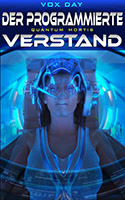Große Jungs weinen nicht ist eine Novelle des Militär-Sci-Fi-Autors
Tom Kratman, der für „A Desert Called Peace“ und seine „Carrera“-Serie
bekannt ist. Die Novelle folgt dem Leben eines Rathas, ein
empfindungsfähiger Superpanzer der Zukunft, der pflichtbewusst die
Schlachten der Menschen auf fremden Welten austrägt. Doch wird die
Kreatur seinen Erschaffern noch immer dankbar sein, wenn sie ihr eigenes
Gewissen entdeckt? Und wie lange gibt sich eine intelligente
Kriegsmaschine, die mit Leichtigkeit eine Stadt dem Erdboden gleich
machen kann, damit zufrieden, dem Menschen ein unterwürfiger Sklave zu
sein?
Has there ever been a better marriage of Author Name and Translation Language than Tom Kratman and die Muttersprache? Ilona Meier has done a fine job translating Big Boys Don’t Cry into German and it was a pleasure to work with her. In a few hours, we’ll also be able to announce the availability of QUANTUM MORTIS Der programmierte Verstand, which was translated into German by the fortuitously named Dr. G, (seriously), who will also be translating John C. Wright’s forthcoming AWAKE IN THE NIGHT LAND.
Plötzlich findet sich die Größere Terranische Herrschaft in einer historischen Krise, als der Raumkreuzer der Shiva-Klasse ATSV Rigel während einer Routinepatrouille durch den Kantillon-Sektor verlorengeht. Zum Glück für das große sternenumfassende Terranische Imperium ist die Topgeheimdienstagentin des Herrschaftlichen Geheimdienst-Direktorats, Daniela York, mit von der Partie. Wird sie jedoch in der Lage sein, die tödliche Verschwörung, die von den gewissenlosen Attentätern des Hauses Dai Zhans eingefädelt wurde, im Schatten des drohenden galaktischen Krieges zu durchdringen, ganz besonders, nachdem das Direktorat herausfand, dass wahrscheinlich auch noch die Cyborgs der Integration Mensch-Maschine beteiligt sind?
In other Castalia House-related news, the well-known Pulp Writer, Jonathan Moeller, has reviewed my recently published story collection, THE ALTAR OF HATE. He writes in his review:
There are some weaker stories in the collection, and oddly enough they are mostly in the front half, like the banquet master of Cana serving the poorer vintages before the choice wines. That said, there were some excellent and interesting stories in the collection, which we’ll examine now:
-“The Lesser Evil” is an interesting combination of historical fiction and time-traveling sorcery. An evil wizard travels back in time to use the dark power released by one of the great slaughters of history (specifically, Genghis Khan’s conquests) to fuel his power, and an organization of good wizards travels back to stop him. The interaction of the wizards with the historical figures was interesting, as was the eventual resolution and twist at the end….
-“The Logfile” was the standout story of the collection, charting an
artificial intelligence’s slow descent into madness. The AI wants to be
helpful and efficient, and starts testing new ways to become even more
helpful and efficient. Then it flies off the rails. Bad things ensue, as
the AI logically and meticulously reasons itself out of morality
entirely.
Read the whole review there, and if you’re a writer, don’t forget to click on the link to his Iron Laws of Storytelling. Or, if you are the sort of individual who finds either a) statistical probability or b) Candy Crush to be amusing, you could simply entertain yourself by playing Kratman Bingo, and seeing how often the covers for all three Kratman editions appear simultaneously on the blog.
UPDATE: Der programmierte Verstand is now live on Amazon.

